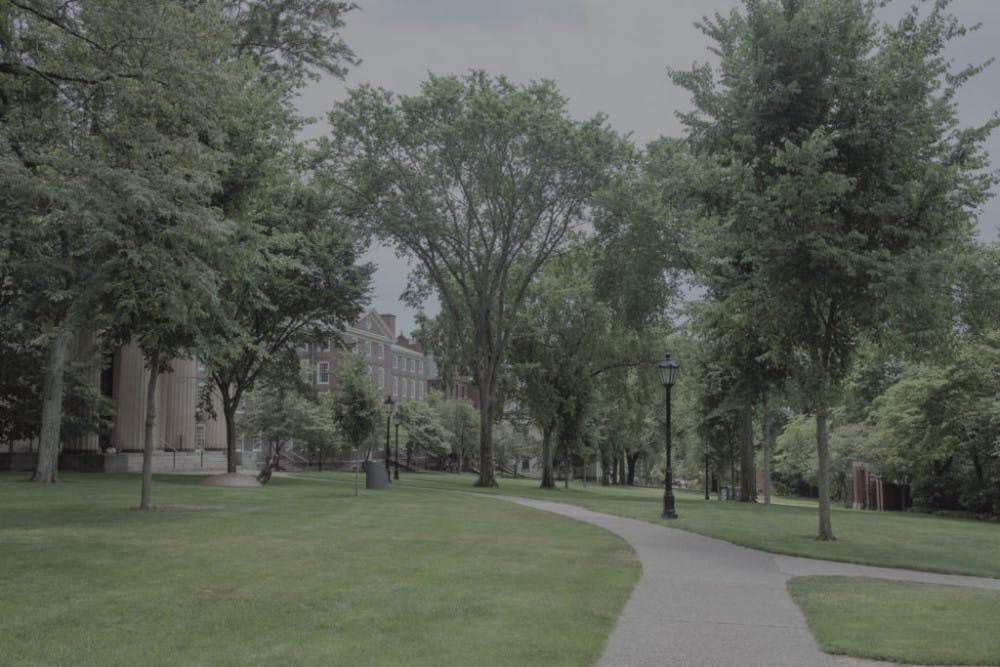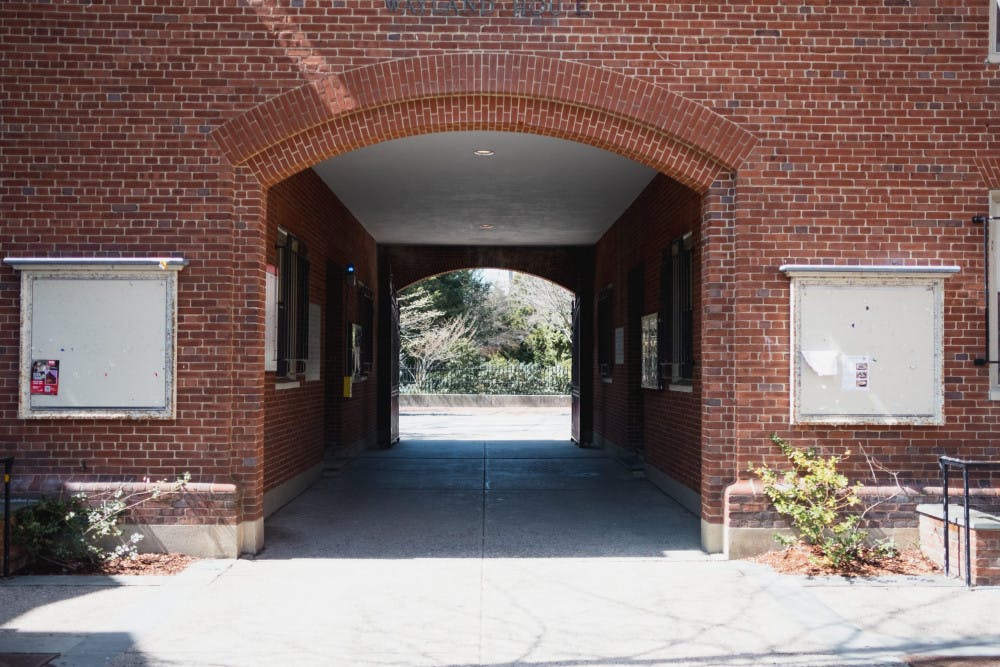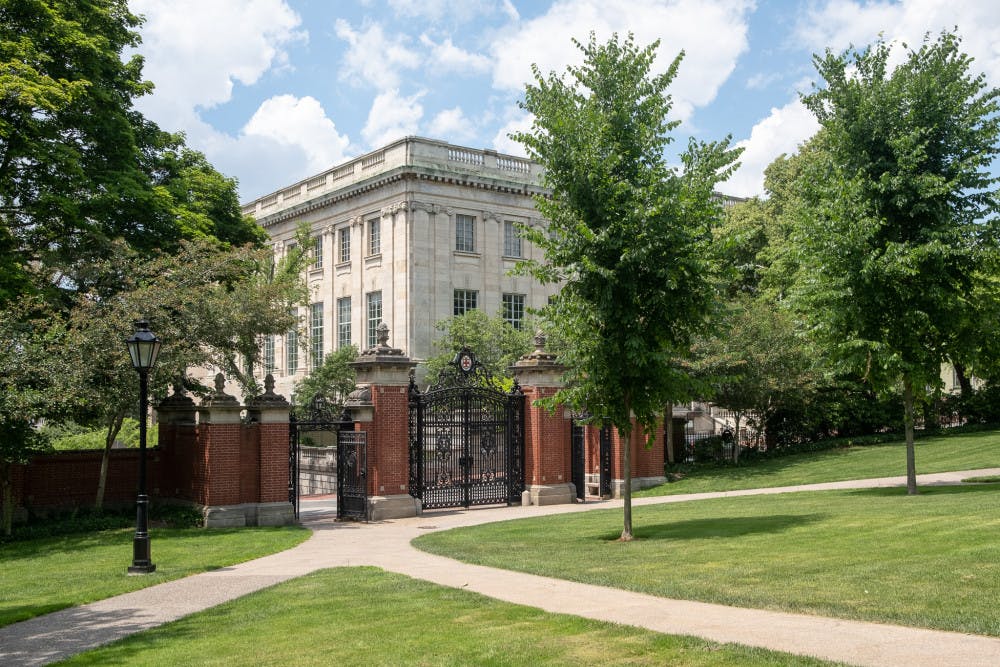In light of the ongoing COVID-19 pandemic, the University will resume on-campus instruction in the fall under a tri-semester model.
Under this model, the University will offer instruction in the fall, spring and summer of the 2020-21 academic calendar, according to a community-wide announcement sent Tuesday by President Christina Paxson P’19. Students will enroll in two out of the three terms: Incoming first-years will be allowed to come to campus for the spring and summer semesters, while sophomores, juniors and seniors may return for the fall and spring. Sophomore enrollment may be shifted to fall/summer if public health recommendations change.
Students must decide by July 15 whether they plan to return to Providence or study remotely for the fall semester, according to a follow-up email sent Tuesday by Vice President for Campus Life Eric Estes and Dean of the College Rashid Zia.
With this distribution of students across three terms, in addition to anticipated reductions in enrollment due to travel restriction and other limitations for some students, around two-thirds of the student body is expected to be present on campus in the fall.
Students will be tested for COVID-19 upon returning to campus, and will be expected to self-isolate during a 14-day “quiet period” at the start of each term, according to the revised academic calendar. Reusable masks — three of which will be provided to each student — and social distancing will be required in public, according to a website outlining plans for the upcoming academic calendar.
Students will live in mostly single-occupancy housing in an effort to reduce density in residence halls as well as minimize shared use of restrooms. Those living on campus will be clustered into “pods” to minimize the spread of the virus in the event of a positive case.
Some seniors may be assigned by the Office of Residential Life to off-campus apartments near shuttle routes leased by the University. “These units will be assigned and billed as if they are on-campus housing, but may have additional policies set by the private property manager,” according to the website.
Students who cannot return to campus due to travel, visa or other restrictions may take courses remotely. Students on campus can also opt to take classes virtually. All courses with over 20 students will be remote.
The University's announcement follows modifications to Immigration and Customs Enforcement policy for international students related to online classes. Yesterday, the Student and Exchange Visitor Program announced changes to temporary exemptions regarding enrollment in online classes for international non-immigrant students on F-1 and M-1 visas.
For the fall 2020 semester, students on these visas must take some classes in person to remain in the United States, ending an exemption that allowed those students to take a full online course load without affecting their status following campus closures in March.
Students attending schools adopting a hybrid model "will be allowed to take more than one class or three credit hours online" if the schools certify that the student's course load is not entirely online and that "the student is taking the minimum number of online classes required to make normal progress in their degree program."
The University has not yet made an announcement about the implications of this change for its own hybrid plan, but is expected to provide further information for international students later today, according to an email from Paxson reviewed by The Herald.
[caption id="" align="aligncenter" width="650"]

Public health conditions
The decision to return to campus under a tri-semester model comes as coronavirus cases in the United States continue to rise. Only two states — Vermont and Connecticut — are considered “on track to contain COVID,” according to Covid Act Now. Rhode Island is one of only a few states in which the number of new cases is declining and is currently in Phase 3 of its reopening plan.
By adopting this model, the University intends to minimize the population density of students on College Hill during any given semester in order to enable proper social distancing and other public health measures necessary to mitigate the spread of COVID-19.
Today’s announcement of a staggered return to campus also puts the University in the ranks of Yale, Dartmouth, Penn, Cornell, Columbia, Princeton and a number of other peer institutions that have all said they will allow for some degree of on-campus instruction, rather than a fully remote fall. Harvard announced yesterday that all teaching would take place virtually, but up to 40 percent of undergraduates would be allowed to return to campus. The University is the last Ivy League institution to release its plan for the upcoming academic year.
Since concerns about the novel coronavirus outbreak sent the majority of students home in March, Paxson has spoken out repeatedly about the importance of bringing students back to campus in the fall. She wrote an April 26 op-ed in the New York Times and testified before a United States Senate committee about the potential detriment, should campuses remain closed, to both students and higher education as a whole.
The large majority of students surveyed by the University in May indicated a strong preference for on-campus experiences for the upcoming academic year, The Herald previously reported. In addition, when asked about their preferences under the tri-semester model, 85 percent of first-years, 87 percent of sophomores and 90 percent of juniors all identified the fall/spring semester combination as their first choice.
[caption id="" align="aligncenter" width="650" caption="Since students left campus in March, President Paxson has spoken repeatedly about the importance of bringing students back to campus — including in a New York Times op-ed and in testimony in front of a U.S. Senate committee."]

Academics and life on campus
Fall classes will begin Sept. 9, but students will need to arrive on campus earlier in order to self-quarantine. Classes will end before Thanksgiving, and students who leave College Hill for the holiday will need to remain away from campus and conduct their reading period and final exams remotely. Students who stay in Providence for the Thanksgiving break will be allowed to remain on campus. All final exams will end by Dec. 11.
The spring 2021 semester will begin Jan. 20, and the summer term will begin May 12.
Most courses will be taught in a hybrid fashion, in which both in-person and remote learning will be accommodated. All large lectures will be held virtually, and in-person classes and sections will be restricted to 20 students or fewer. But if health conditions in Rhode Island worsen during the fall, Paxson added that all classes may shift to remote-only.
Although first-years will not be enrolled full time, they will be able to attend one class for credit in the fall, virtually and free of charge.
Faculty will have ultimate discretion in how their courses are offered and they will not be required to teach in person if they elect not to. Instructors will teach a normal course load for two out of the three terms.
Classrooms, libraries and dining halls will be reconfigured for social distancing; for those students enrolled in a meal plan, all dining will be grab-and-go style for the fall semester. Meals will be delivered to those students in quarantine or self-isolation.
A decision by the Ivy League on athletics is expected to be announced July 8.
Safety measures
In partnership with state and local public health authorities, the University will conduct surveillance testing for all community members throughout the year and implement technology-enabled contact tracing.
All students will be required to sign an attestation that they will follow required public health measures, and that they “understand that disregard of public health practices is a conduct violation that could result in removal from campus,” according to Paxson’s email.
Brown has partnered with a third-party vendor to engage in a routine testing pilot this summer that will inform the University’s testing strategy in the upcoming academic year.
All symptomatic community members throughout the year will be tested. To monitor the spread of infection, the University will also conduct COVID-19 randomized sample testing, which will involve testing randomly selected students each week.
Students and other community members will also be required to use a digital tool to schedule tests and record daily symptoms. This data will be “useful for identifying health trends on campus and informing the amount of routine testing that is needed,” Paxson wrote in her email.
The large majority of undergraduates surveyed by the University expressed a willingness to submit to testing and install contact tracing software on mobile devices if asked, The Herald previously reported. A full 95 percent of respondents said they would be willing to be tested if asked, and 78 percent of students said they would be willing to install contact tracing technology on their mobile devices. The survey, which was sent to all undergraduate students May 17, garnered an 84 percent response rate.
The City of Providence asked local universities and students to “follow best practices and health guidelines set forth by the (Rhode Island) Department of Health,” wrote Patricia Socarras, the mayor’s press secretary, in an email to The Herald. Socarras also encouraged students to “support the local businesses that make our city unique,” while complying with health and safety guidelines.





